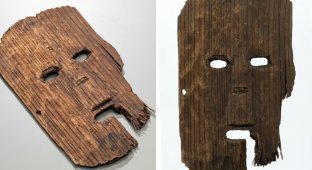Lady Zheng is the Chinese pirate queen who is not remembered in China (10 photos)
One of the most successful pirates in history was a woman. A former prostitute from China named Lady Zheng commanded over 1,800 ships and 80,000 pirates. 
In the late 18th century, merchants brought silks, tea, and porcelain from China in exchange for gold, silver, and imported goods. Merchant ships loaded with goods undoubtedly attracted the attention of local robbers. Often merchant ships became easy prey, because states did not have the means and strength to give a worthy rebuff to the robbers. Some pirate gangs were controlled by competent strategists and represented autonomous communities with their own “legal” norms, economy and hierarchy. Mrs. Zheng's gang stood out clearly from the others - the Cantonese robber kept Chinese and European sailors at bay, becoming the most successful sea robber of all time. However, this success went virtually unnoticed in China. 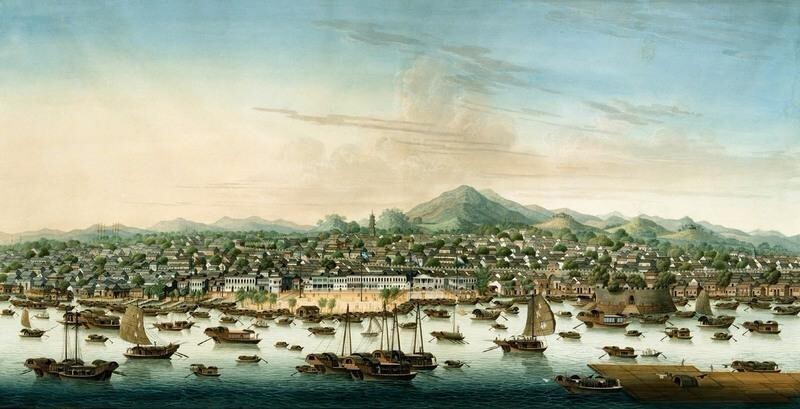
Canton in the 1800s.
At the turn of the 18th and 19th centuries, six large pirate gangs were robbing the Pearl River Delta, in the Chinese transport triangle of Guangdong-Hong Kong-Macao. Having concluded an alliance among themselves and dividing spheres of influence, they became especially powerful, which instilled fear in traders from China and other countries. They brought many problems to the local government, but in the absence of funds in the treasury and decent military equipment, it was almost impossible to cope with them. Thus, even government ships accompanying, for example, salt officially approved for sale, paid pirates of one gang for protection from another gang.
The most famous of the six pirate groups was the "Red Flag Gang" (???) led by Zheng Shishi and her husbands - first the pirate leader Zheng Yi (??, Cheng I, 1765 - 1807), and then his named son Zhang Baotsai (???, Cheung Po Tsai, 1786 – 1822). In better times, the gang had up to 1,000 ships at its disposal, and the total number of robbers reached 40,000 people. 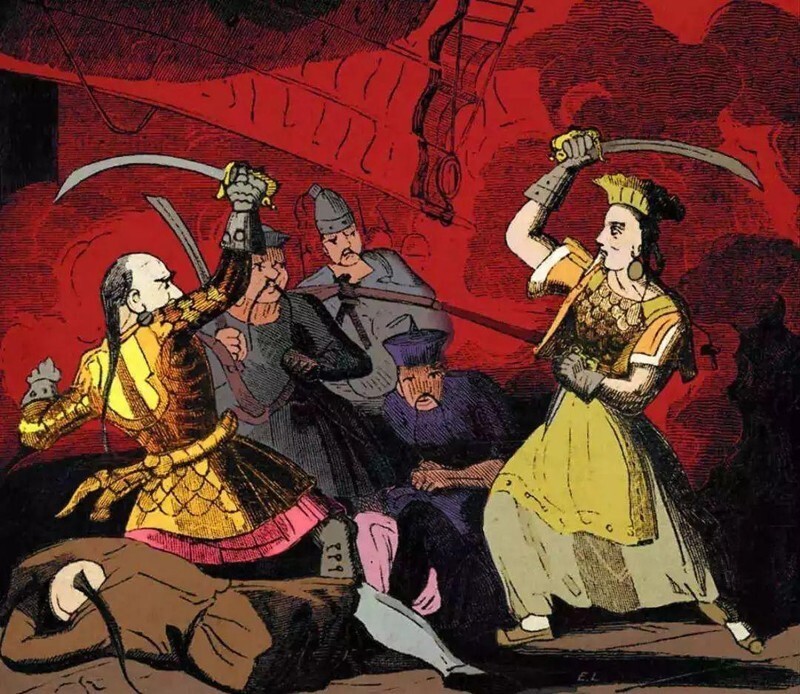
Colorized engraving. Zheng Shishi in battle.
Pirate Queen
The world-famous Chinese robber and female pirate Zheng Shishi (???, Ching Shih Shih), who in English literature is also often referred to as Zheng Shi (Ching Shih), in her youth bore the name Shi Xiugu (???), and after her first After marriage she took the name Zheng Yisao (???). There are other versions of her names in different languages - Shih Heang Koo, Ching I Sao, Ching Shih Shih, ??, Lady Chin, Qing or Shi. There is also an opinion that the last two hieroglyphs ?? V ??? it is inappropriate to translate as a name, and it is possible to translate as “Zheng, nee Shi”, or “Zheng from the Shi family”.
Born in 1775 in Canton, the future “Pirate Queen” belonged to the Tanka people, who live on boats along the coasts of Guangdong and Fujian provinces. In her youth, she worked as a prostitute in a local brothel, but at the age of 26 she was kidnapped by pirates and soon married the most powerful Chinese pirate of those years, Zheng Yi, taking the name Zheng Yisao, which literally translates as “Zheng Yi’s wife.” Thus began her “career” as a sea robber.
At that time, Chinese army generals and government officials resigned one after another due to constant failures in the fight against naval bandits. In 1804-1805 alone, the commander of the Guangdong fleet changed three times. The “Red Flag Gang” occupied the islands that are now part of Hong Kong, and also collaborated with pirates from the city of Son Tay in Vietnam (now a suburb of Hanoi), supplying them with equipment for naval battles. 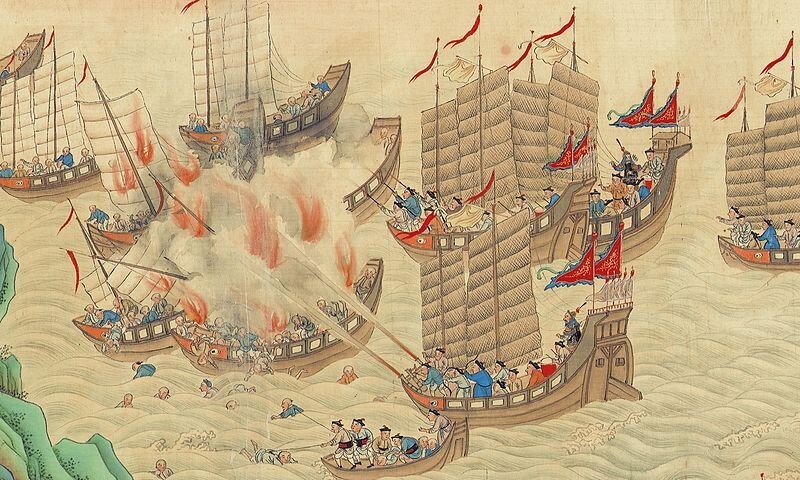
Sea battle with pirates in the early 19th century in South China.
According to contemporaries, the weapons of the robber gangs led by Zheng Shishi were far superior to local government and private armed forces. For example, in 1807, the governor of Guangdong and Guangxi, Wu Xiongguan (???, 1750 - 1833), reported that during the capture of about a dozen pirate ships, many high-quality weapons for naval and land combat were discovered. The emperor was simply shocked: “If only a few ships are so armed, then what is the power of their entire fleet?!”
Mother, wife, widow and lover
After the death of pirate leader Zheng Yi in November 1807 in Vietnam, his wife Zheng Shishi faced enormous responsibility and the risk of being overthrown by other hostile pirate gangs. In those years, it was difficult to imagine that a woman could single-handedly manage a fleet, even a pirate one. Therefore, Zheng Shishi not only hastily appointed her son Zheng Baocai, the heir to Zheng Yi, as her management partner, but also turned to her many influential acquaintances and relatives on the side of her deceased husband for support. As a result, through a series of strategic moves, Zheng Shishi and Zhang Baocai jointly captured and lured hundreds of pirate ships and tens of thousands of pirates to their side, only strengthening the power of Zheng Yi’s widow and son. 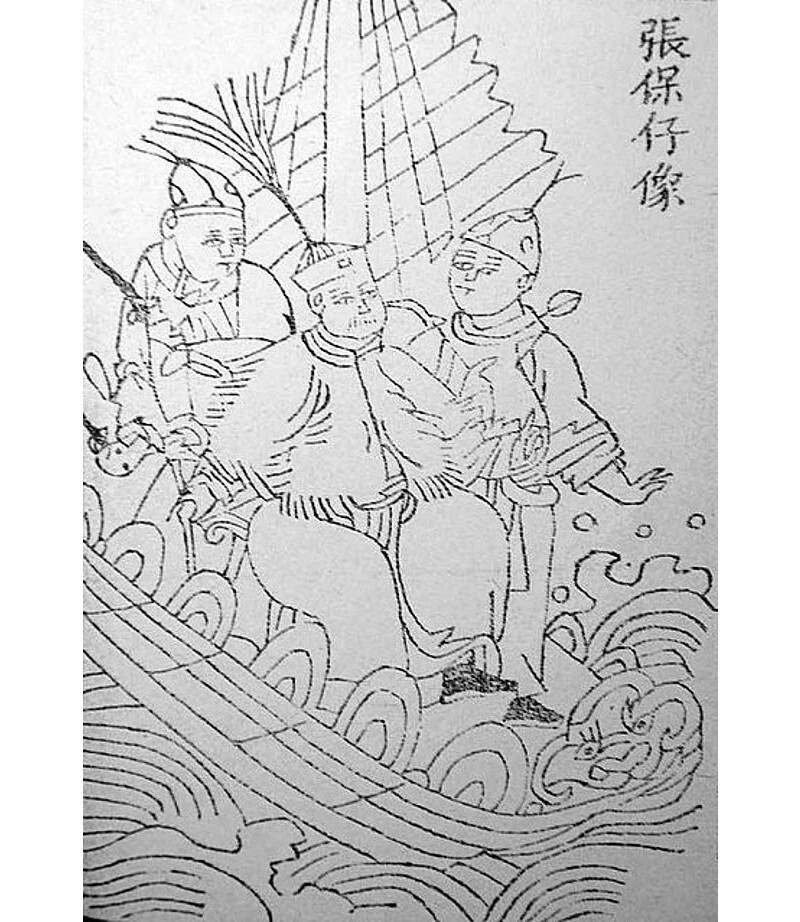
Portrait of Zhang Baocai.
What added piquancy to the reputation of the pirate widow was that she secretly maintained a love relationship with her adopted son, who had previously been kidnapped in Guangdong from the Tanka people, like herself. The woman put a lot of effort into making Zhang Baocai become the number one figure in her gang. According to historians, he was a charismatic leader, while all important decisions were invariably made by his former named mother and current mistress Zheng Shishi; Much later, the couple officially registered their relationship.
It is known that in two marriages Zheng Shishi gave birth to sons Zheng Yingshi (???, Cheng Ying Shih) and Zheng Xiongshi (???, Cheng Heung Shih) - from her first husband and a daughter Zhang Yulin (???, Cheung Yu Lin) - from the second.
Attacks on large and small commercial and fishing vessels, kidnappings for ransom, destruction of production, terrorizing both local and foreign residents and visitors to coastal areas - all this kept the region in fear. Women and children also fought selflessly in the pirate detachments of Zheng Shishi, which amazed the sailors. The fame of the most influential female pirate of that era went far ahead of her sea robbers, despite the fact that Zheng Shishi had only been a pirate for ten years. 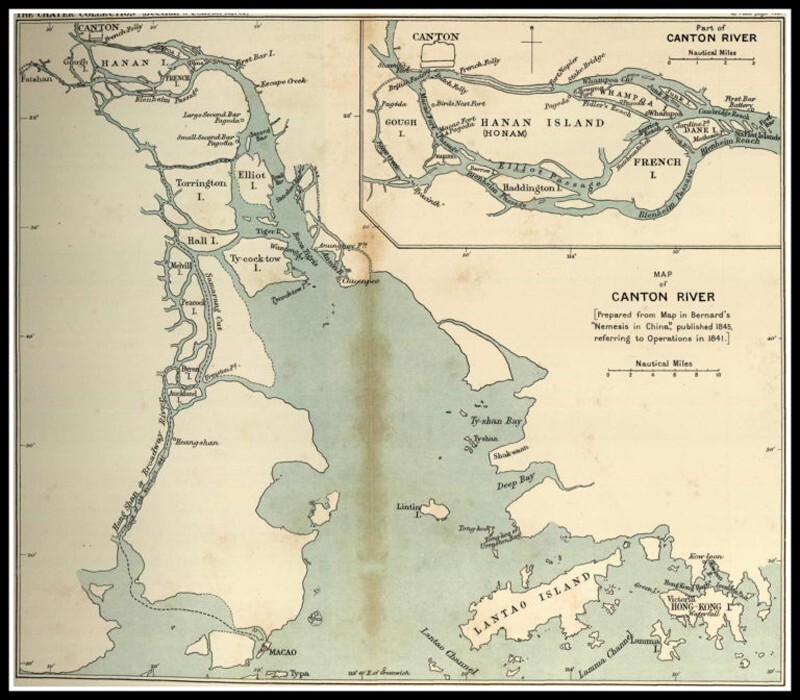
Territories “controlled” by the Zheng Shishi gang
Tough Rule
The pirate fleet under the command of Zheng Shishi established hegemony over many coastal areas of southern China. The pirates could not be defeated by Chinese officials of the Qing dynasty, nor by Portuguese or British bounty hunters. One of the tools for maintaining discipline in the ranks of robbers was the so-called “Pirate Code”, developed personally by Zheng Shishi and promulgated by her husband; he strictly regulated life and inspired both fear and respect.
The Code provided not only for severe punishments (up to and including beheading on the spot) for unauthorized excommunication from the ship, theft from pirates or their allies, causing harm to one’s own and arbitrariness. According to the rules, the one who found the loot received 20% of the loot, and the rest was placed in a special fund or distributed equally. At the discretion of the management, part of the loot could be used to purchase supplies for other ships that were not so successful in battle.
There were also special rules for female captives: only the most beautiful remained with the robbers as concubines or wives, the rest were released or given for ransom. If a pirate made a captive his wife, he had to be faithful to her. Rapist pirates were executed, but if they had consensual sex with captives without the “official” formalization of the relationship, then both were executed. 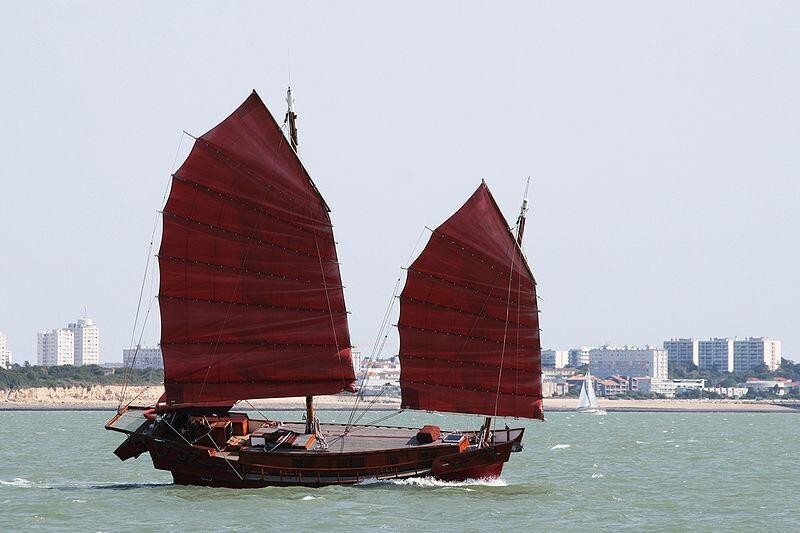
A modern version of the junks that pirates preferred to use.
Gang surrender
In the fall of 1809, the fleet of Zheng Shishi and her husband suffered a series of defeats from the Portuguese fleet, reinforced by allies among enemy pirates. In winter, the leader of pirate groups on the east coast of Guangdong named Guo Podai (???) asked the governor of Guangdong and Guangxi Zhang Bailin (???) to accept surrender on terms favorable to the pirates. Having learned about this incident, Zheng Shishi and her husband decided to “bargain” a quiet life from the government in exchange for the military power of the bandit fleet, which they controlled for several years. Hearing the request for surrender, the governor was overjoyed and personally led a delegation to the ship of the “king and queen of the Chinese pirates.”
On January 21, 1810, the Red Flag Gang, led by Zheng Shishi and Zhang Baocai, surrendered to the Portuguese fleet and accepted the terms offered by the Qing government to all pirates who agreed to voluntarily leave the ranks of the bandits. The historic surrender took place near Chek Lap Kok Island, where Hong Kong International Airport is now located.
Thus, in 1811, the Qing court, without firing a single shot, received from sea robbers 270 large ships, 16,000 former male sea robbers, 5,000 female and children pirates, 7,000 swords and spears, as well as 1,200 artillery pieces. According to the terms of the agreement between the bandits and the government, the pirates retained all previously stolen goods. In addition, those who surrendered voluntarily were allowed to engage in peaceful professions, and they were also offered positions in the military bureaucracy.
Despite the fact that many of the robbers whom Zheng Shishi persuaded to capitulate received ranks under the government, her decision caused a split in the pirate society - tens of thousands of bandits remained in Hong Kong and Southeast Asia who refused to surrender.
Peaceful life
After the surrender in 1810, Zheng Shishi and her husband moved to Fujian Province, where Zhang Baocai received the rank of first lieutenant. However, according to legend, he changed his former name and became the captain of the Guangdong fleet under the government of the Qing dynasty.
On the eve of the death of her second husband, Zheng Shishi demanded that the government officially recognize them as legal spouses. Despite restrictions on the remarriage of widows in those years in China, her request was granted - in 1821 she acquired the status of a civil servant's wife, and in 1822 she became a widow for the second time. 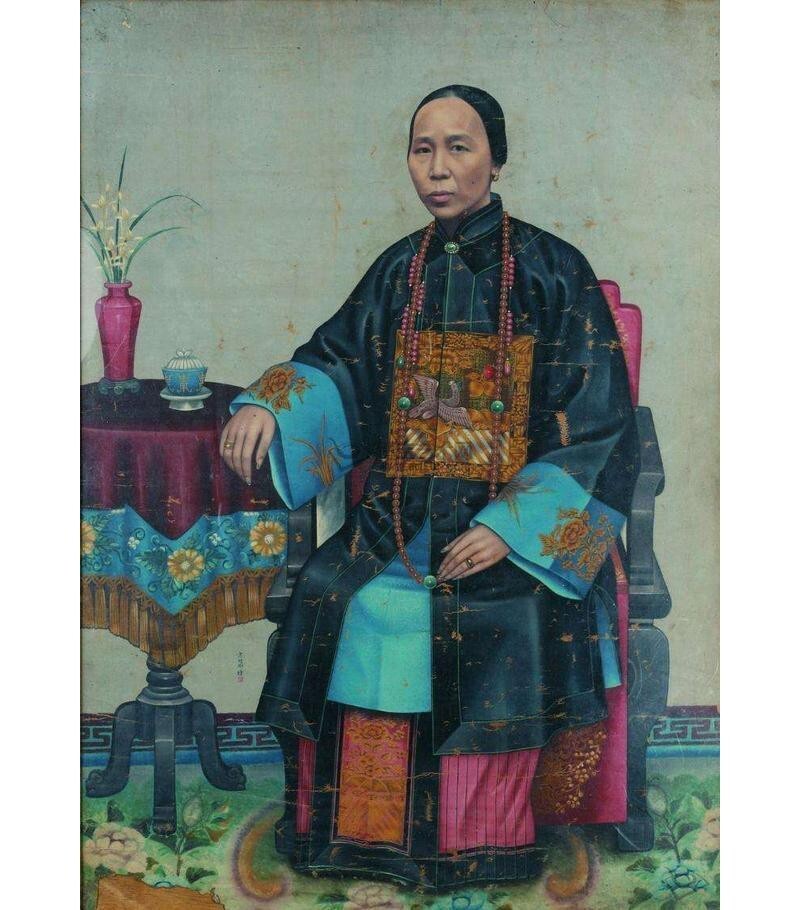
The image of Zheng Shishi during the period of peaceful life
After the loss of her husband, Zheng Shishi moved to Macau, keeping in her private fleet, according to various sources, from 30 to 120 ships. There she opened a casino and sold imported table salt, a fairly profitable product. During the First Opium War, she provided valuable strategic advice to imperial official Lin Zexu (???, 1785 – 1850) on how to fight the British army.
The world-famous "Pirate Queen" died of illness in Macau in 1844, aged 69, surrounded by family and friends.
The luckiest pirate of all time
Surprisingly, in the West the story and image of the sea robber Zheng Shishi is much more popular than in China. Mrs. Zheng became the prototype for the pirate queen Mistress Ching (???, Mistress Ching) in the third film of the series, “Pirates of the Caribbean: At World's End.” In the adventure film, she was played by American actress and singer of Japanese origin Takayo Fischer. Zheng Shishi and her “exploits” in the field of sea robbery have been described in numerous books, novels, video games and films about piracy. 
Characters from a video game based on Pirates of the Caribbean. Top left is Ms. Zheng. 
The image of Zheng Yisao in Chinese pop culture.
Two centuries later, trade by sea in southern China is no longer as dangerous as it once was. The resurgence of Chinese piracy in the area in the 1920s was a faint imitation of the past "greatness" of the tough sea robbers of the days of the legendary Lady Zheng, which no one else could and probably will not be able to match.


















